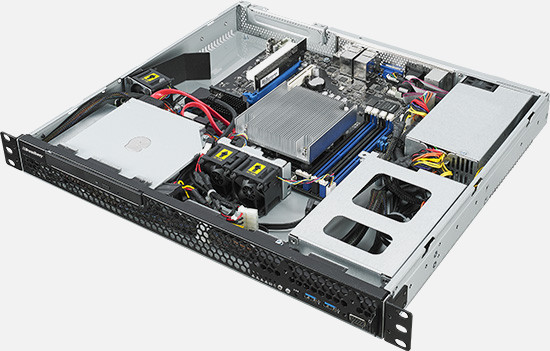Read Product Review Cyberserve Xeon E-RS100-E11
A powerful hardware package at an affordable price that's ideal for SMBs and remote workers.
Dave Mitchell Feb 2021 |

Configure From R25,312.94 or Configure

A powerful hardware package at an affordable price that's ideal for SMBs and remote workers.
Dave Mitchell Feb 2021 |

Configure From R25,312.94 or Configure


If you need a powerful server that will fit into the smallest of spaces, the CyberServe Xeon E-RS100-E10 fits the bill perfectly. It delivers a quality hardware specification, with a good set of storage options, in a 1U chassis that's just 384mm deep.
Broadberry uses an Asus RS100-E10-P12 barebones system as its base, kitting it out with a speedy 3.4GHz quad-core Intel Xeon E-2224 CPU. The price includes 16GB of DDR4 memory, but the board will accept 32GB DIMMs, so you can boost the RAM to a maximum 128GB.
Storage capacity is impressive too, considering the modest size of the server. The drive cages on either side each support either one large form factor (LFF) hard disk or two small form factor (SFF) SSDs, and one big advantage of going with Broadberry is that it allows you to fit your own choice of drives without invalidating the warranty. On top of this, the Asus P11C-M/4L motherboard sports a pair of M.2 SSD slots that will accept either SATA or NVMe cards at lengths up to 110mm, and Broadberry has populated these with a pair of 250GB Samsung Evo 860 SATA SSDs. These are ideal for running your OS from and can be protected against failure by the C242 chipset, which incorporates an Intel RSTe RAID controller supporting stripes, mirrors and RAID5 arrays.
Fitting and exchanging disks is easy because the interior of the server is impeccably tidy, with all cables secured and neatly tucked out of the way. This ensures that all drive cages are very accessible, and if you're installing a pair of LFF drives, you'll find the necessary SATA and power cables ready and waiting.
Networking connections are well served by a quartet of onboard Gigabit Ethernet ports and a riser card offers a spare PCIe 3 x16 slot, which can be used for a 10GbE network card. Alternatively, you may prefer to add an Asus PIKE II RAID card, which allows you to step up to faster 12Gbits/sec SAS3 storage.
Cooling is handled by three dual-rotor fans; Asus describes these as "Zen-quiet", but we think that's a rather generous description. With fan speed set to auto mode in the BIOS, we measured sound levels of 49.5dB from a metre in front - not too intrusive, but noticeable.
For management, the Asus ASMB9-iKVM plug-in module is included, which provides a web interface offering plenty of information and email alerts for critical components and sensor readings. It isn't as sophisticated as Dell EMC's iDRAC9 or HPE's iLO5 but it has the advantage of including full OS remote control and virtual media services as standard, rather than as chargeable upgrades.
You can also make use of the Asus Control Center (ACC) software, which uses Windows agents to monitor any server brand. It's provided in the form of an OVA virtual machine file and can be tried for free for 180 days, after which a three-year licence costs £60 per managed client. We tested it with Oracle VirtualBox and had no problem using the web console to scan the lab network and push agents to our Windows servers.
The console proved admirably informative, correctly identifying all our servers and presenting a wealth of detail on system vital signs including CPU, memory, storage and network port utilisation, along with full hardware and software inventories. Separate accounts can be created with different console access permissions and warning thresholds for each hardware component may be linked up with email alerting rules.
In all, the CyberServe Xeon E-RS100-E10 represents a cracking hardware specification at a great price. Although it isn't as quiet as Asus implies, we love the low-profile chassis, the fine selection of remote-management tools - and the freedom to fit your own drives.